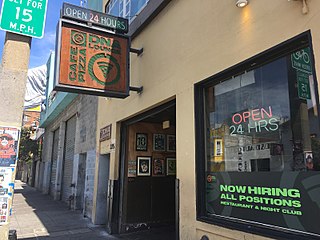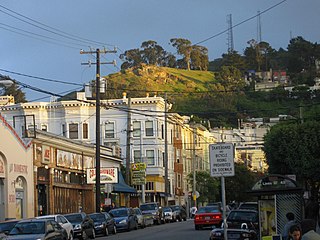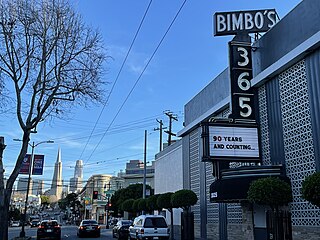Related Research Articles

The Mabuhay Gardens, also known as The Fab Mab or The Mab, was a former San Francisco nightclub, located at 443 Broadway Street, in North Beach on the Broadway strip area best known for its striptease clubs. It closed in 1987.

Paradise Garage, also known as "the Garage" or the "Gay-rage", was a New York City discotheque notable in the history of dance and pop music, as well as LGBT and nightclub cultures. The 10,000 square feet (930 m2) club was founded by sole proprietor Michael Brody, and occupied a building formerly located at 84 King Street in the SoHo neighborhood. It operated from 1977 to 1987 and featured resident DJ Larry Levan.

DNA Lounge is an all-ages nightclub and restaurant/cafe in the SoMa district of San Francisco owned by Jamie Zawinski, a former Netscape programmer and open-source software hacker. The club features DJ dancing, live music, burlesque performances, and occasionally conferences, private parties, and film premieres.


Cole Valley is a small neighborhood in San Francisco, California. It borders Golden Gate Park to the north, Haight-Ashbury to the northeast, The Castro to the east. and Twin Peaks to the south. Near Kezar Stadium, Cole Valley is the smallest neighborhood in the city.

The Barbary Coast was a red-light district during the second half of the 19th and early 20th centuries in San Francisco that featured dance halls, concert saloons, bars, jazz clubs, variety shows, and brothels. Its nine block area was centered on a three block stretch of Pacific Street, now Pacific Avenue, between Montgomery and Stockton Streets. Pacific Street was the first street to cut through the hills of San Francisco, starting near Portsmouth Square and continuing east to the first shipping docks at Buena Vista Cove.
The Holy City Zoo, which called itself "the comedian's clubhouse", was a small but influential comedy club in San Francisco that operated from the mid-1970s to the mid-1990s.


Ruby Skye was a former popular nightclub located at 420 Mason Street in the Tenderloin neighborhood of San Francisco, California, in operation from 1990 to 2017.

The Trocadero Transfer, or The Troc, was an after hours dance club in operation from December 1977 to the late–1990s in San Francisco, California, U.S.. It was located at 520 4th Street at Bryant in the SoMa neighborhood. The club has been compared to Studio 54 in New York City, and their patrons would travel from other cities to attend the party.

Gatecrasher One was a nightclub in Sheffield, South Yorkshire, England. The club was a converted warehouse owned by the Gatecrasher dance music brand. The nightclub was originally named The Republic, but this was changed in 2003 after a £1.5 million refurbishment. On 18 June 2007 the venue caught fire and partially collapsed. The building was later demolished.
Audrey Joseph is an American record executive, nightclub owner and manager, and LGBT rights activist.
The Boarding House was a music and comedy nightclub, located at 960 Bush Street in San Francisco, California, opened by David Allen in 1971 and closed in the early 1980s. Many comedians launched their career at the boarding house including Robin Williams. Steve Martin's first three albums were recorded there, Let's Get Small, A Wild and Crazy Guy, and Comedy Is Not Pretty!, in whole or in part. Ellen DeGeneres and Jay Leno have said they first met at The Boarding House.
Tier 3 was an influential but short-lived 300-capacity no wave art nightclub in New York. Founded by Hilary Jaeger in 1979, Tier 3 was a major venue in the city's underground music and counterculture post-punk art scene, along with the Mudd Club. Live performances showcased punk rock, no wave, ska, noise music, free jazz, new wave and experimental music. The club was located at 225 West Broadway in the TriBeCa neighborhood of lower Manhattan.

Bimbo's 365 Club, also known as Bimbo's 365, is an entertainment club located at 1025 Columbus Avenue in San Francisco. It specializes in live rock and jazz shows. The location is one of San Francisco's oldest nightclub sites, and has operated under two names with a series of owners. The building started as Bal Tabarin in 1931, the same year that the 365 Club started at 365 Market Street. The two locations under separate ownership consolidated in 1951 to one location owned by Agostino "Bimbo" Giuntoli.
Death Guild is the oldest continually operating gothic/industrial dance club in the United States, and second in the world. Death Guild opened on March 15, 1993, and is currently held every Monday at DNA Lounge in San Francisco.

LGBT culture in Portland, Oregon is an important part of Pacific Northwest culture.
The Showgirl Magic Museum is a history and culture museum in the Chinatown neighborhood of San Francisco, California in the United States. The museum showcases on the 20th-century nightclub scene in Chinatown.
Divas Nightclub & Bar was a San Francisco nightclub located at 1081 Post Street in the Polk Gulch neighborhood of San Francisco, California, where it was located since 1998, prior to closing. With three floors, the club catered predominately to trans women and their admirers, until it closed on March 30, 2019. Prior to its location at 1081 Post Street, Divas had opened in 1989 across the street at the corner of Post and Larkin, under the name Motherload.

715 Harrison is a nightclub venue located in the SoMa neighborhood of San Francisco, California, known mostly for hosting Club X since 1989 and previously City Nights from 1985 to 2020. The club is designated by San Francisco as a legacy business and is additionally known within the Bay Area for being one of the few venues consistently open to guests above 18 years of age, rather than 21, as is the case with most clubs.
References
- 1 2 3 Whiting, Sam (2000-04-11). "Plenty of Joints Are Jumping in the Neighborhood". SFGATE. Retrieved 2021-10-22.
- ↑ Whiting, Sam (1997-07-10). "Clubs Go Back to the '80s / Nostalgia lays down the beat at retro parties". SFGATE. Retrieved 2021-10-22.
- ↑ "Features: Gay Asian Clubs". MetroActive. May 4, 1998. Retrieved 2021-10-22.
- ↑ Tudor, Silke (2000-07-19). "Night Crawler". SF Weekly. Retrieved 2021-10-22.